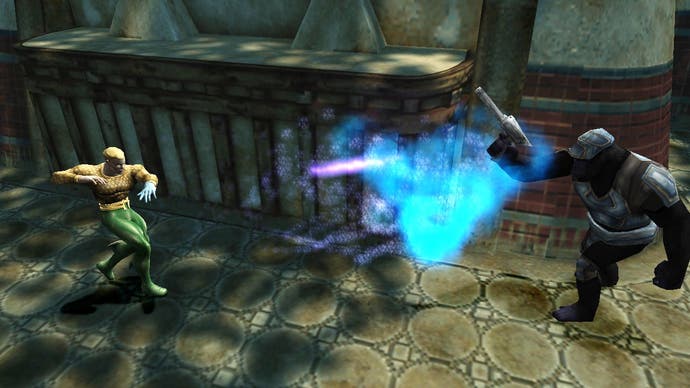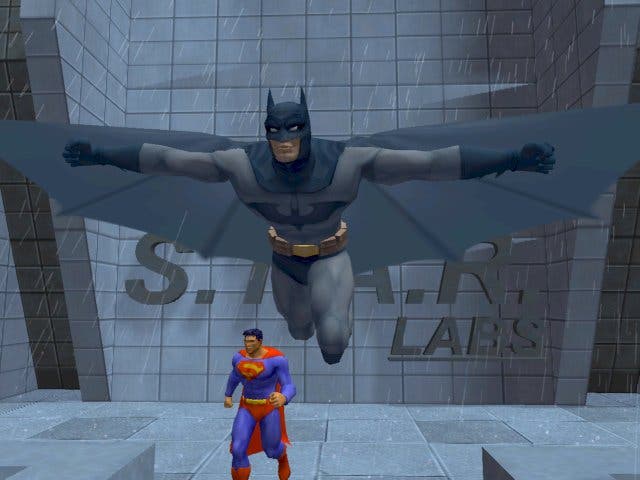Justice League Heroes
Moore or less?
It's hard to imagine just what it is exactly that comics have to do in order to become culturally esteemed. Despite a Pulitzer Prize for Art Spiegleman's Maus, the story of his father's survival of Auschwitz that brims with tears and sad importance; despite the consistently back-breaking and astonishing prose of Alan Moore's twenty years of output From Hell to Watchmen; despite the tender, broken honesty of Steven Seagal's wrestle with Superman in It's a Bird, or the sub cultural incisiveness of our own Kieron Gillen's Phonogram (we have to be nice about that one else, if the opening chapters are anything to go by, he'd rape us with magic) they're still ranked lower than blue cheese on the leaderboard of humanity's creative output. Being several places higher than videogames probably isn't much comfort.
But then, in Justice League Heroes, a comic book made videogame, as you flick a buckling dumper truck onto your upturned palm and launch it into the facial circuitry of a rebellious robot lunging not three metres away without even laddering your lycra, you have to ask: who gives a flying hulk. It's quickly clear that superhero comics, fired in the crucible of boyhood dreams of catching speeding bullets, fearlessly fighting crime, panning X-ray vision across crowds of girls and enjoying super human strength and simpering fans can still etch excitement across the highest of brow. Indeed, it's this visceral joy that Justice League Heroes so successfully marries with the similarly basic but instinctive gameplay of the arcade hack and slasher.

Developer Snowblind Studios became famous for Baldur's Gate: Dark Alliance and it's this experience creating mostly mindless-but-enjoyable hack and slash dungeon crawlers that underpins this game. The mash-up works fantastically; the superhero repapering lending the formula a freshness and urgency missing from its cloak and dagger dressed orc cousins. The Justice League, for the uninitiated, is DC's superhero supergroup (made up of Superman, Batman, Green Lantern, Wonder Woman, Martian Manhunter, Zatanna and The Flash). Formed in the 1960s but recently made popular through Cartoon Network's reimagining, this game shares the same scriptwriter, Dwayne McDuffle, as the animated series, and the look of Superman and Batrman et al has been retained even if the voice actors have been changed.
For comic book nerds the developer has worked hard to chisel a coherent and pleasing universe that will satisfy those who are eager to see whether they RUINED EVERYTHING by giving Killer Frost underpants one shade too light or INEXPLICABLY misspelling the Green Lantern's mother's maiden name. For everybody else, the DC locales of Metropolis, Gorilla City and the Justice League's Watchtower are pleasing, if unremarkable, backgrounds about which you can sock some criminals in the face.
You'll have chance to play as each of the seven core JLH team members although, for the first half of the game, there's no choice as to who you play as at any one time. Levels are attempted by hero pairings, the AI taking reasonable control of your partner in single-player mode with the brilliant co-op mode allowing you and a friend to work together. Your moves are broken down into core elements of physical attacks, special attacks, blocking and jumping. The latter two are self-explanatory although, notably, double tapping jump makes flying heroes erm... fly. Each character enjoys a normal and powerful standard attack - combinations of which can be happily strung together to make quick work of the relentless shower of enemies - but it's the special moves that really disguise the wonder-women from the super-men.

Initially each hero has access to three special powers, which are activated via a special menu. Abilities and gadgets attributable to each mythology (such as Superman's heat vision, Batman's bat swarm or Zatanna's firebolt) are kept here and these signature moves colour the game where it might have started to become stale. Even if, broadly speaking, each special move falls comfortably into classic ranged/close category of attacks, having recognisable names and animations for these moves is surprisingly satisfying - especially when set against the abstract inventions of traditional hack and slash gametypes. Orbs are collected from downed enemies and these accrue to give the player points to spend on upgrading abilities, increasing individual stats or unlocking new moves. This RPG-esque customisation is fairly by the book but it lends the game a depth that takes it one step the right way away from one-dimensional arcade gaming.
Levels are designed linearly and the player's mission remit never varies much beyond beating up everybody in sight until the party reaches the final boss, occasionally rescuing a few stranded civilians on the way. Brilliantly, environmental furniture can be thrown all over the place by stronger characters and this ensures you scan each scene for useful debris to turn into a weapon. Checkpoints save automatically and, as the game employs the lens flare of our day - regenerating health when not engaged with an enemy - when it does offer a challenge, it feels neither unassailable nor unfair.
Justice League Heroes is neither particularly clever nor particularly beautiful. Instead it's relentlessly videogamey - distilling most of the clichés that onlookers might hold about both comics and videogames. But low culture can often be more brilliant, enticing, exciting, and fun than its loftier-minded contemporaries. Justice League Heroes is one such title, clothing aged, and unsubtle form in resplendent function, good humour, and a world populated by a set of timeless, glittering comic book characters. All of which presents a package that makes a mockery of recent high profile superhero titles that never come close to being this super or, indeed, heroic.

